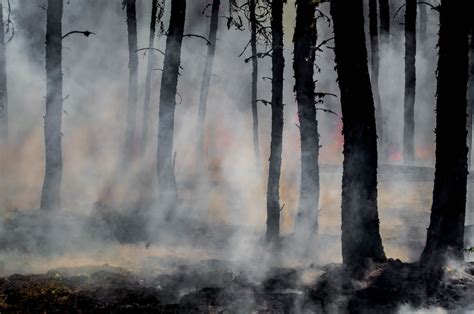Wildfires are not just about the flames and smoke billowing into the sky. They have a hidden impact that goes beyond what meets the eye – affecting our mental health in ways we might not even realize. Imagine this: you see the orange glow on the horizon, smell the acrid scent of burning trees, and feel the oppressive weight of smoke hanging in the air. It’s not just your physical health that is at risk; it’s your mental well-being too.
In a groundbreaking study conducted by experts like Kari Nadeau, a distinguished figure in Climate and Population Studies, and chair of Environmental Health Department, startling revelations have come to light. Nadeau states with conviction, “Wildfire smoke isn’t just a respiratory issue — it affects mental health, too.” This statement alone should make us pause and ponder over the far-reaching effects of wildfires.
The research findings delve into uncharted territory by pinpointing how wildfire-specific PM2.5 can directly exacerbate conditions such as depression, anxiety, and mood disorders. As Nadeau emphasizes, it’s not merely about the physical destruction caused by wildfires but also about the silent psychological toll exacted by their smoke.
Picture this: The eerie stillness after a wildfire has passed through an area – homes reduced to ashes, landscapes transformed into desolate wastelands. Amidst this devastation lies another consequence that often goes unnoticed – a surge in mental health emergencies. The study published in JAMA Network Open sheds light on this previously overlooked aspect of wildfires.
The study meticulously examines data from California during its tumultuous wildfire season in 2020 – where emergency department visits for various mental health conditions were analyzed alongside levels of wildfire-specific PM2.5. The numbers tell a stark tale: 86,588 mental health ED visits during that period highlighted how exposure to wildfire smoke led to a significant uptick in cases related to depression, anxiety, and other mood-affective disorders.
“Our study suggests that — in addition to trauma a wildfire can induce — smoke itself may play a direct role in worsening mental health conditions.”
It’s chilling to realize how something as seemingly transient as wildfire smoke can cast such long shadows over people’s lives. Each inhalation carries more than just particulate matter; it carries invisible burdens that weigh down on our minds and spirits long after the fires have been extinguished.
Interestingly, certain demographics were found to be more vulnerable to these adverse effects – women, children, young adults, Black and Hispanic individuals along with Medicaid enrollees faced heightened risks of experiencing mental health emergencies due to exposure to wildfire-specific PM2.5. These disparities underscore existing healthcare inequities that are further exacerbated by environmental factors like wildfires.
“We need to make sure everyone has access to mental health care during wildfire seasons…particularly as wildfires become more frequent…”
YounSoo Jung aptly points out how critical it is for policymakers and healthcare providers alike to ensure equitable access to mental health resources during wildfire seasons – especially for those most at risk within our communities. As climate change continues unabated leading to more frequent and severe wildfires globally, preparing for these unseen impacts on mental well-being becomes imperative.
This study serves as an urgent call-to-action for society at large – highlighting how crucial it is not only to mitigate the physical damages caused by wildfires but also address their profound influence on our collective psyche. After all, healing from a disaster doesn’t end when the flames die down; sometimes, it’s just when another silent battle begins within ourselves.

